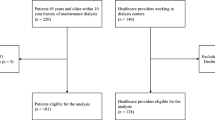Abstract
Despite the usefulness of advance directives,most dialysis patients do not complete them. Current views of the advance care planningprocess emphasize that development of aspecific written advance directive is only onesmall part of the process. Patients andfamilies use advance care planning discussionsto plan for death, achieve control over theirhealth care, and strengthen relationships. Studies of chronic dialysis patients have shownthat discussions about end-of-life care occurwithin the patient–family and not thepatient–physician relationship. Successfuladvance care planning requires that dialysiscare providers incorporate end-of-life carewishes and palliative care into the overallhealth care plans for their patients. Thisreview focuses on the past impediments toachieving useful advance directives amongdialysis patients and their families andprovides some suggestions to improving thisimportant aspect of dialysis patient care.
Similar content being viewed by others
References
Lynn J. Perspectives on care at the close of life. Serving patients who may die soon and their families: the role of hospice and other services. JAMA 2001; 285: 925–932.
Lynn J, Goldstein NE. Advance care planning for fatal chronic illnesses: avoiding commonplace errors and unwanted suffering. Ann Int Med 2003; 138: 812–818.
US Renal Data System. Excerpts from the USRDS 2002 Annual Data Report: atlas of end-stage renal disease in the United States. Am J Kidney Dis 2003; 41(suppl 2): S1–S260.
Neu S, Kjellstrand CM. Stopping long-term dialysis: an empirical study of withdrawal of life-supporting treatment. N Engl J Med 1996; 314: 14–20.
Leggat JE, Bloembergen WE, Levine G, Hulbert-Shearon TE, Port FK. An analysis of risk factors for withdrawal from dialysis before death. J Am Soc Nephrol 1997; 8: 1755–1763.
Holley JL, Finucane TE, Moss AH. Dialysis patients' attitudes about cardiopulmonary resuscitation and stopping dialysis. Am J Nephrol 1989;9: 245–251.
Holley JL, Hines SC, Glover JJ, Babrow AS, Badzek LA, Moss AH. Failure of advance care planning to elicit patients' preferences for withdrawal from dialysis. Am J Kidney Dis 1999; 33: 688–693.
Singer PA. Advance care planning in dialysis. Am J Kidney Dis 1999; 33: 980–991.
Holley JL, Stackiewicz L, Dacko C, Rault R. Factors influencing dialysis patients' completion of advance directives. Am J Kidney Dis 1997; 30: 356–360.
Fried TR, Bradley EH, Towle VR, Allore H. Understanding the treatment preferences of seriously ill patients. N Engl J Med 2002; 346: 1061–1066.
Schonwetter RS, Walker RM, Kramer DR, Robinson BE. Resuscitation decision making in the elderly: the value of outcome data. J Gen Intern Med 1993; 8: 295–300.
Moss AH, Hozayen O, King K, Holley JL, Schmidt RJ. Attitudes of patients toward cardiopulmonary resuscitation in the dialysis unit. Am J Kidney Dis 2001; 38: 847–852.
Singer PA, Thiel EC, Naylor CD, Richardson RMA, Llewellyn-Thomas H, Goldstein M et al. Life-sustaining treatment preferences of hemodialysis patients: implications for advance directives. J Am Soc Nephrol 1995; 6: 1410–1417.
Quill TE. Initiating end-of-life discussions with seriously ill patients: addressing the "elephant in the room". JAMA 2000; 284: 2502–2507.
Hines SC, Glover JJ, Holley JL, Babrow AS, Badzek LA, Moss AH. Dialysis patients' preferences for advance care planning and end-of-life decision making. Ann Int Med 1999; 130: 825–828.
Perry E, Swartz R, Wheelock-Smith L, Westbrook J, Buck C. Why is it difficult for staff to discuss advance directives with chronic dialysis patients? J Am Soc Nephrol 1996; 7: 2160–2168.
Renal Physicians Association and the American Society of Nephrology. Shared Decision-Making in the Appropriate Initiation of and Withdrawal from Dialysis. Clinical Practice Guidelines. Washington, DC, February 2000.
Kapron K, Perry E, Bowman T, Swartz RD. Peer resource consulting: redesigning a new future. Adv Renal Replac Ther 1997; 4: 267–274.
Lynn J, Schuster JL, Kabcenell A. Improving Care for the End of Life: A Source Book for Health Care Managers and Clinicians. New York: Oxford University Press, 2000.
Author information
Authors and Affiliations
Rights and permissions
About this article
Cite this article
Holley, J.L. Advance care planning in elderly chronic dialysis patients. Int Urol Nephrol 35, 565–568 (2003). https://doi.org/10.1023/B:UROL.0000025645.28122.a9
Issue Date:
DOI: https://doi.org/10.1023/B:UROL.0000025645.28122.a9




